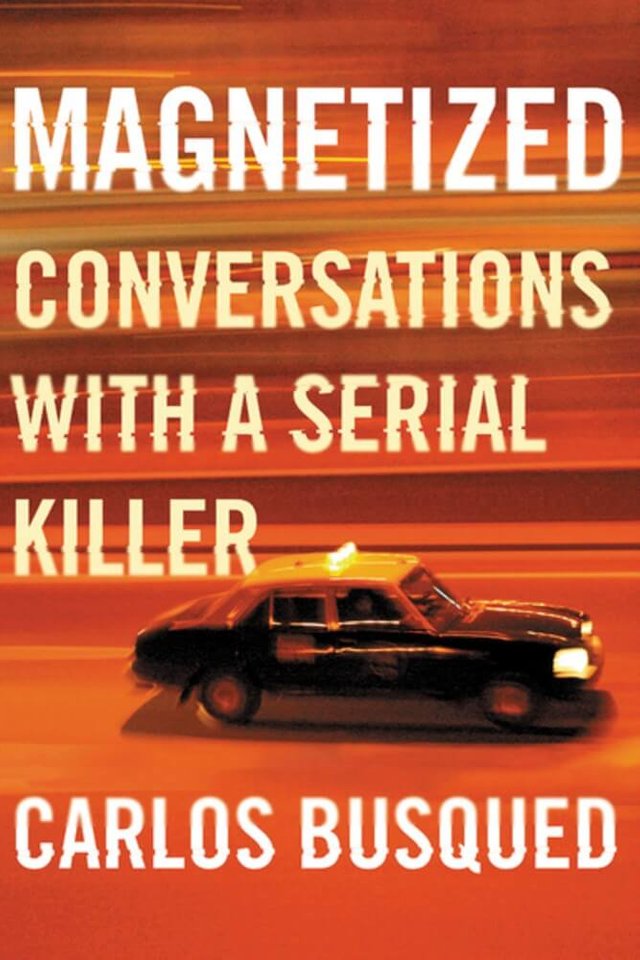
This book surprised me.
I have read many true-crime books about serial killers, most of which follow the same kind of pattern:
- the serial killer is portrayed as a monster
- every person around the serial killer says he/she was so quiet and calm
- the people who caught the serial killer are portrayed as heroes
- everything’s wrapped up nicely at the end
I won’t spoil the book but I do say this: there is none of the above in this book.
The book mainly consists of a complex yet simplified talk between the author and its subject, Ricardo Melogno, who murdered four taxi drivers in Argentina in 1982.
Since then, Melogno has been in jail. The important starting point Busqued isn’t turning Melogno into some kind of monster, but rather showing him for who he was and always has been: a human being.
What was his mood like during the interrogation? He was very serious [pauses to reflect]. Yes. Very serious. The great mystery here is why he chose those particular taxi drivers. Because there’s no logic to it. When I asked him about it, he said it was “very complicated.” I think this was one aspect of Melogno, not his whole personality.
Why did you stop trying to kill yourself?
I stopped going to school. That was the source of everything.
Was each attempt due to something at school?
Absolutely. I never had the instinct for self-preservation. What do I mean by that? If you stick your fingers in an electrical socket, and you get a shock, you think about it for a moment, and you don’t put your fingers in the socket again. If I was in the same fucked-up situation, I’d get to the point of trying to kill myself, I’d fail, I’d face up to my mother, and she’d beat the living daylights out of me, and then in three months the same thing would happen again. I had no instinct to save myself; I never learned from my mistakes.
Perhaps it’s a bit more complicated than that?
I’m just trying to explain it in simple terms. Besides all that, karma is karma. If I was meant to die then, I would have died. If I didn’t die, it’s because for me, there was more to come.
Unfortunately, for a very long time I was very wrongheaded. Besides the acts that I committed themselves, at a certain point I realized that the grim fascination surrounding the murders created a space for me. I used my dangerousness as a calling card.
I liked the look of disgust on people’s faces when I talked about certain things, and so I got to exaggerating or changing details in my stories. There was one judge, a professor at the university, who visited for many years, bringing his new students, twenty or thirty of them each time, to speak to me. When I told my story and the guy thought I was toning it down a bit, he’d spur me on a little: “Ricardo, tell my students how you committed your murders, how you watched the bodies crumple. Tell them about the blood, Ricardo.”
I watched the expressions on those people’s faces and then I’d exaggerate. The judge looked after me well; he was very friendly. After our meetings, he’d take the students on a little tour of Unit 20, so they’d get to see what a madhouse looks like. One day, when the visit with the students was over, one of the psychiatrists from my team came to get me and take me back to my cell, but she pretended like she was being careless and let me trail behind the professor as he left, so I could eavesdrop. He had no idea I was listening there behind him, and he spoke to the group as they left the building: “The day you meet a monster, you’ll know it straightaway, because what you just saw in there was a monster.”
My mistake was not protecting myself from harmful attention. It pisses me off that those people left feeling happy, feeling superior, because they had a monster with which to compare themselves. It hurts that I was the one to gift them that moment. I think that was related to another issue, the question of being heard and accepted.
People paid attention to me during those visits. And I participated in the discussion like an actor reading a script. I bought into the charade because people paid attention to me, and then to hold their attention I added a few details to the facts. What sort of details? Like taking blood from the victims, things like that. I’d change things up, I’d take in the look of fear on their faces and sort of improvise.
The only expectation I have, the only transcendental debt, is to become a person. I’ve been a cockroach. And then I was a monster. Now I’m a prisoner. I would like to be a person. I’d never hide who I was, but . . . I’d like to be a normal person. The more I can blend in among everyone else, the better. That’s the debt I owe myself, to be just like everyone else. Lost in the crowd.
This book is more interesting than many other books about murderers. It’s not a hagiography despite the fact that it focuses entirely on a murderer; his life, as with any human life, carries nuance and that is ultimately what makes this book work.